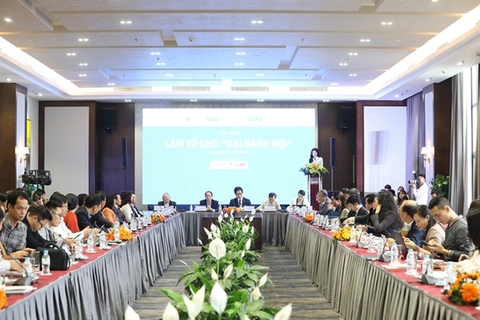
Experts discuss solutions to promote private sector development. — VNS Photo
Private enterprises do not need money but institutional support to enjoy a stable and safe business environment, bringing them equality and respect.
Vu Tien Loc, Chairman of Viet Nam Chamber of Commerce and Industry (VCCI), made the statement at a conference held in the northern province of Quang Ninh on Friday.
Creating a transparent and equal investment environment among business sectors is always an important issue when discussing the disadvantages of the private sector, especially in accessing important resources such as the labour market, business rights and information.
After more than three years of implementation of Resolution 10, private businesses have become more protected. At the same time, there is also a better playing field for the sector when participating in economic fields. The private firms therefore have contributed to the economy as they attract about 85 per cent of the country’s total workforce while contribution to GDP is always over 43 per cent. Meanwhile, the contribution to GDP of the State economic sector and foreign direct investment (FDI) sector are 29 per cent and 18 per cent, respectively.
However, Loc said that domestic companies in many localities are not as highly appreciated as foreign firms despite creating value and jobs.
Many private businesses also said that when localities called for FDI, they commit to provide site clearance and are ready to be fined if they fail to meet the schedule as foreign investors often have high requirements. However, for domestic enterprises with even larger size than foreign companies, there is no such commitment, he added.
The chairman added that the private economic sector in Viet Nam has not only 8,000 businesses, but over 6 million, including business households. The first priority should be improving their quality, scale, efficiency and competitiveness not quantity. The entrepreneur’s desire is to have an environment for domestic businesses for their self-relianance and development.
Sharing the idea, Tran Dinh Thien, former director of the Viet Nam Economics Institute, said the FDI sector contributes 20 per cent of GDP but accounts for 70 per cent of the total import-export turnover. This could be an issue as FDI firms could enjoy most trade benefits from the country’s efforts in international integration.
“Viet Nam’s approach to business development must be revised. We need to rely on domestic capacity, based on domestic economic forces and consider the private economy as an important driving force. Private enterprises must be Vietnamese enterprises. If we follow the spirit of the Party and consider the private economy as an important driving force, the economy will grow even more,” he said.
“By studying economic development in some countries, we realise that the large corporations of South Korea account for about 50-60 per cent of GDP. If Viet Nam could build such businesses, they could lead strong economic development, being the wings for Viet Nam to take off,” said Vu Thanh Thang, Vice Chairman of Bkav Group.
He also proposed to choose outstanding enterprises with good competitiveness in technology; creating an environment for businesses to boom, in which capital, human resources, markets and policies are particularly important. Once there are products with a high localisation rate, the Government needs to create a springboard for this product to be popular and strongly developed in Viet Nam before reaching the global market.
Pham Dinh Doan, chairman of Phu Thai Group agreed, saying that there is a large proportion of small-and-medium enterprises (SMEs) in Viet Nam, but a lack of leading enterprises. The reason is that many units cannot be transparent and share their business activities, and it is difficult to accompany development.
“The Government needs to have a coherent plan for businesses to thrive in the next five to 20 years. In particular, there should be a policy to limit the number of units participating in some professions to avoid wasting resources,” he said.
Huong Tran Kieu Dung, vice chairwoman of FLC Group, said in addition to construction planning, infrastructure and human resources, the prerequisite factor to attract “eagles” as well as promote the strong development of investors is the behaviour and interaction between local authorities and businesses.
“If businesses receive a sincere welcome from the local government, they will feel sympathetic and secure when making investment. Investors always want to invest in a locality in the long term. Therefore, businesses are interested in how the investment process will be handled by the locality. This depends on the transparency in the direction of each province,” Dung said. — VNS